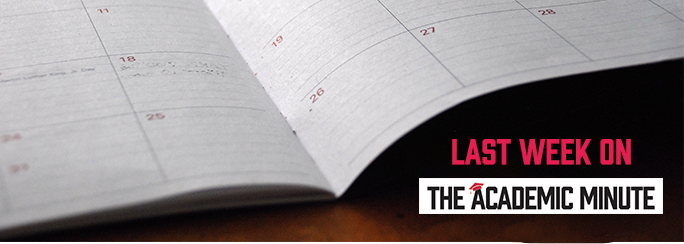
The Academic Minute from 3.27 – 3.31
Monday
Moussa N’Gom – Rensselaer Polytechnic Institute
Optics: The Future of Computation and Medicine
Moussa N’Gom is an assistant professor in the Department of Physics, Applied Physics, and Astronomy at Rensselaer Polytechnic Institute.
Following an early career in industry as a senior research scientist in ultrafast lasers, optical communications, and materials processing, N’Gom joined the Center for Ultrafast Optical Sciences at the University of Michigan. There, he explored light transmission through highly scattering media through light manipulation or wavefront shaping.
The newly emerging field of optical wavefront shaping involves the ability to manipulate light fields both spatially and temporally. It has largely been enabled by the availability of spatial light modulators, or SLMs. SLMs are used to create arbitrarily complex light fields that are now powerful elements of the optics toolbox. An SLM also provides the means to manipulate the fundamental constituents of classical light or single photons, which obey the laws of quantum physics.
Tuesday
Wolf Gruner – University of Southern California
#LastSeen Project: Unknown Pictures, Untold Stories of the Holocaust
Wolf Gruner is the Shapell-Guerin Chair in Jewish Studies and Professor of History at the University of Southern California, Los Angeles since 2008, and Founding Director of the USC Dornsife Center for Advanced Genocide Research since 2014. He is an appointed member of the Academic Committee at the US Holocaust Memorial Museum since 2017. He received his PhD and habilitation from the Technical University Berlin. Gruner is the author of ten books, including Jewish Forced Labor under the Nazis. Economic Needs and Nazi Racial Aims with Cambridge University Press (2006) and Parias de la Patria“. El mito de la liberación de los indígenas en la República de Bolivia 1825-1890 (2015) and the prize winning The Holocaust in Bohemia and Moravia. Czech Initiatives, German Policies, Jewish Responses (2019). He also coedited four more books, including „Resisting Persecution. Jews and Their Petitions during the Holocaust” (2020), and “New Perspectives on Kristallnacht: After 80 Years, the Nazi Pogrom in Global Comparison” (2019). His new study Resisters. How Jews fought Persecution in Hitler’s Germany about forgotten stories of widespread individual Jewish resistance is forthcoming with Yale University Press in summer 2023.
Wednesday
Arianna Maffei – Stony Brook University
Children’s Food Experiences Shapes Grown-Ups’ Taste Preferences
I am a neuroscientist and I study how experience and learning affect the brain. I obtained my Bachelor degree in Biology in 1997 and my PhD in Biophysics in 2002, both from the University of Pavia (pronunciation: https://www.youtube.com/watch?v=fFoMSPIA_3g) in Italy. In 2002, I moved to the United States to continue my training in neuroscience at Brandeis University, under the guidance of Dr. Gina Turrigiano. In 2008, I joined the faculty at Stony Brook University where I established my research group. The goal of my research is to determine how the experience with taste and food influence the development and function of brain circuits.
Thursday
Marilynn Desmond – Binghamton University
Christine de Pizan on Gender and Warfare in the Middle Ages
Marilynn Desmond holds a doctorate in Comparative Literature from the University of California at Berkeley. She has published extensively on the reception of Classical texts in medieval vernacular literatures, especially French and English.
Friday
David Drake – University of Wisconsin-Madison
Human and Coyote Co-Existence in Urban Areas
David Drake is a Professor and Extension Wildlife Specialist in the Department of Forest and Wildlife Ecology at the University of Wisconsin-Madison. His research and extension programs primarily focus on wildlife and wildlife damage management in human-dominated landscapes. David also teaches an undergraduate course on wildlife damage management. David received his Ph.D in Forestry from North Carolina State University, a M.S. degree in Wildlife and Fisheries Sciences from Texas A&M University, and a B.A degree in Biology from Macalester College.
